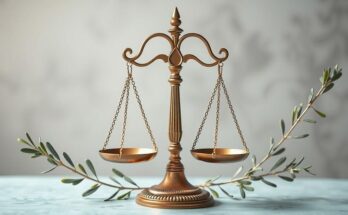Ukraine’s new law banning religious organizations connected to the Russian Orthodox Church raises significant concerns about violations of religious freedom. Human Rights Watch warns this could unjustly affect the Ukrainian Orthodox Church’s congregations and their ability to worship freely. The law mandates severing ties with the Russian Orthodox Church, risking the repression of spiritual practices and community identity amidst ongoing military tensions with Russia.
In a concerning move, Ukraine has enacted a new law prohibiting religious organizations linked to the Russian Orthodox Church, raising alarms about potential violations of religious freedom. Human Rights Watch argues that the law could inadvertently suppress congregations of the Ukrainian Orthodox Church, the nation’s largest denomination, thus impacting millions of worshippers reliant on this faith community. The law, introduced on August 20, 2024, seeks to cut ties with the Russian Orthodox Church entirely, labeling any organization with connections to it or any entity from countries deemed aggressive towards Ukraine as culpable. Under this law, any identified organization must sever such ties within nine months or face legal dissolution. Human Rights Watch’s Hugh Williamson emphasized that while security concerns are warranted given the ongoing conflict, the law oversimplifies the challenges faced and could infringe on fundamental rights. To ensure compliance with international human rights obligations, they urge Ukraine to consult with expert bodies for a thorough review and revised guidelines. The Ukrainian Orthodox Church, established in 1990, had sought autonomy but continues to be associated with the Russian Orthodox Church due to the latter’s ongoing support for the war. Although the Ukrainian Orthodox Church has publicly opposed the invasion, health officials have deemed its autonomy efforts inadequate, perpetuating its connection. The law deliberately targets ties beyond institutional linkages, extending to doctrinal affiliation, potentially invalidating the spiritual legitimacy of many adherents. Scholars have noted that enforced separation from the Russian Orthodox Church may drive the Ukrainian Orthodox Church underground, complicating their connections and diminishing their influence within occupied areas. Ukrainian security measures have involved prosecuting numerous clergy on grave accusations related to collaboration with enemy forces. With such sweeping implications, Human Rights Watch cautions that widespread enforcement of the law could lead to grave restrictions impacting church property, worship access, and entrapment in pervasive surveillance and potential charges. The Ukrainian state insists that the law is essential to safeguarding current security, yet this approach runs the risk of fostering discrimination against those practicing their faith peacefully. The state’s insistence on separation undermines the rights guaranteed under both domestic and international frameworks regarding religious expression and assembly. Critically, laws prohibiting practices merely based on affiliations violate the established tenets of international human rights. Ukraine must balance state security with fundamental rights, ensuring actions taken are based on specific threats rather than indiscriminate bans targeting entire religious communities, a strategy that could sow deeper divisions in a fragile landscape of faith and trust.
The tensions between Ukraine and the Russian Orthodox Church have escalated amid ongoing military conflict. The recent law reflects Ukraine’s effort to sever connections with Russian influence in the wake of its invasion. It raises fundamental questions about religious freedom and human rights, especially as it potentially targets the Ukrainian Orthodox Church, which has sought autonomy yet historically remains tied to the Russian ecclesiastical hierarchy. Understanding these dynamics is crucial to grasping the implications of the new law.
The recent law banning religious organizations linked to the Russian Orthodox Church in Ukraine casts a shadow over the country’s commitment to religious freedom. While security concerns are valid amidst ongoing conflict, the broad application of this law threatens the constitutional rights of millions, especially followers of the Ukrainian Orthodox Church who have opposed the war. A careful, measured approach is necessary to uphold both state safety and individual freedoms.
Original Source: www.hrw.org



